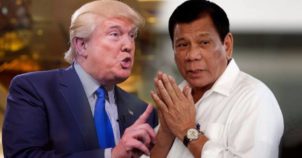
By Nick Meynen.
The battle between autocratic leaders and the global movement for environmental justice heats up.
Killing drug dealers through the courts, as US President Donald Trump has just proposed, is one step closer to the drugs policy in the Philippine—where President Rodrigo Duterte supports a killing spree even outside the court system. But if Duterte inspired Trump more broadly during his recent visit to the island archipelago, then it’s not just drug dealers that need to worry. Defenders of the environment, of human rights and of indigenous communities are also victims of widespread extrajudicial executions and attacks in the Philippines.
In early March, Duterte’s government tried to brand some 600 environmental defenders as terrorists, including Victoria Tauli-Corpuz, a UN Special Rapporteur on the Rights of Indigenous Peoples. According to two other UN Special Rapporteurs, this is an act of revenge, after she made public comments in relation to the militarization, attacks and killings of indigenous Lumad peoples by members of the armed forces in Mindanao. Civil society from within and beyond the Philippines are doing what they can to get global attention for this sorry state of affairs regarding human rights defenders, indigenous leaders and environmentalists in the Philippines.
A deadly environment
In the last three years alone, at least 102 people were killed in The Philippines for trying to defend the environment. Only Brazil has been deadlier. Whether it is to protect a beach from being mined for the minerals in the sand, to a legal demand for compensation from a massive nickel mine or simply for climate justice—being an environmentalist in the Philippines is like playing Russian roulette. Over a third of environmental conflicts in the Philippines involve killings of activists—compared to one in eight at the global level. Half of all of the cases in the Philippines involve criminalization or violent targeting of activists. Even compared to other hotbeds of environmental conflicts, such as Brazil and India, many more conflicts in the Philippines are “high intensity” conflicts including widespread mass mobilization, violence and arrests. Further information is available in the global Atlas for Environmental Justice.
One of the most recent mobilizations attracting media attention are the wide-spread protests against a new dam that will displace 13,000 people. In exchange for softening claims in the South Chinese Sea, Duterte has been attracting Chinese companies in the Philippines, companies that are not used to dealing with strong civil society organizations protecting the rights of indigenous people.
To understand how determined some people in the Philippines are to protect the environment, one should read the account of “Tata” in The Guardian’s series The Defenders. Broken arms and grueling search-and-find missions through thick rainforest do not prevent people like him from confiscating chainsaws from illegal loggers—all of it outside of the law. He does it because the government does nothing to stop them. What is ethical is not always legal … and vice versa. In the Philippines you still find people who are willing to pay a price that most other environmental campaigners will not: their lives
New legal ammo for environmental defenders?
One glimmer of hope for brave environmentalists all over the world is that legal momentum seems to be on their side. In 2016 the International Criminal Court said it is now also open for business to put environmental criminals in the dock. Twenty-four countries in Latin-America and the Caribbean recently adopted a new legal framework to provide access to justice on environmental matters—like the Aarhus Convention already does in Europe. Big Oil is being sued from all sides and this month there was the launch of the Framework Principles on human rights and the environment from John Knox, the UN’s Special Rapporteur on that issue. The global movement for environmental justice welcomed this as good news because it gives new legal ammunition to human rights defenders and environmentalists alike.
Looking at the state of play of the journey of humankind on this planet, a polarization seems to emerge. On one side, we find increasingly autocratic leaders who openly or secretly crackdown on people defending the environment. From the confrontation at Standing Rock to the suppression of the Gezi Park protests in Turkey to the fast growing list of environmental defenders killed in so many countries. But on the other side of the medallion we find an increasingly rich legal arsenal to protect these very same people and thus the ecosystems that we all depend on. In parallel, there’s the rise of global coalitions supporting local activists, in what has been dubbed by some scientists as the emergence of a global movement for environmental justice. In this pivotal moment in history, where urgent action is needed to protect the environment on a scale and at a speed never seen before, environmentalists all over the world ask themselves which laws will prevail: the laws of reason or the laws of the jungle.

The project ENVJUSTICE has received funding from the European Research Council (ERC) under the European Union’s Horizon 2020 research and innovation programme (grant agreement No. 695446)